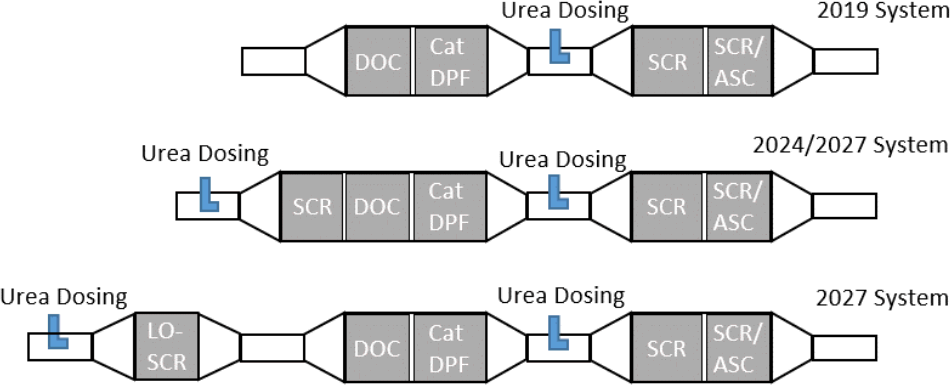MECA releases report on feasibility of lower NOx emission systems for heavy-duty engines
4 February 2020
The Manufacturers of Emission Controls Association (MECA) released a feasibility report on emission control and fuel efficiency technologies for heavy-duty diesel on-road engines that are expected to be used to reduce NOx emissions by 90% below today’s certification levels with simultaneous CO2 emission reductions in the 2027 timeframe.
The US 2007/2010 emission standards for heavy-duty engines required a ~90% reduction of NOx emissions to meet the NOx limit of 0.2 g/bhp-hr. At the time, this emission level was often referred to as “near-zero” emissions. However, due to the ever increasing vehicle population, this limit is no longer adequate—further NOx emission reductions from on-road heavy-duty vehicles are necessary to address air quality in California and many other parts of the United States.
Both the United States Environmental Protection Agency (EPA) and California Air Resources Board (CARB) have announced rulemakings to strengthen the heavy-duty engine emission standards, with a focus on NOx emissions under real driving conditions, including low speed urban driving. In January, the EPA issued an Advance Notice of Proposed Rule for their Cleaner Trucks Initiative (CTI).
The EPA is targeting implementation from 2027, while CARB intends to phase-in new standards beginning in 2024, and align them in 2027 with the EPA requirements as a national standard. A possible regulatory scenario considered by MECA involves a 0.05 g/bhp-hr NOx standard in California, effective 2024, followed in 2027 by a set of nationwide NOx standards of 0.02 g/bhp-hr over the FTP/RMC and 0.075 g/bhp-hr over the new low load cycle (LLC). The useful life for the heavy heavy-duty diesel engine category could be increased from the current 435,000 miles to as much as 850,000-1,000,000 miles.
Based on engine dynamometer test results and emission models from fully aged aftertreatment systems, MECA concludes that engine and aftertreatment technologies are available to achieve the respective FTP/LLC NOx certification levels of 0.02/0.075 g/bhp-hr within the 2027 timeframe. The most likely aftertreatment configurations identified by MECA are shown in Figure 1. The technologies considered in the MECA assessment are designed to meet the current full useful life of 435,000 miles—longer emission durability periods still have to be demonstrated.

The first system is based on MY 2019 engines in production today. The second system employs a twin SCR arrangement that could be implemented in 2024. The third system adds a close-coupled SCR to a 2019-type underfloor system containing a DOC, DPF, and second SCR.
MECA believes the lower NOx emission standards will be met without sacrificing fuel economy and CO2 emissions. Reductions in fuel consumption will be made possible by such engine efficiency technologies as cylinder deactivation, advanced turbochargers, and electrification. MECA expects that the efficiency gains will be sufficient to meet the applicable GHG emission standards, while also enabling the thermal management required by the aftertreatment system, such as increased exhaust gas temperatures during cold start and low load operation.
The MECA report also estimates the added costs of the 0.02 g/bhp-hr NOx emission systems. With current engine durability requirements, the cost of emission controls and efficiency technologies for a vehicle with a 6-7 liter engine is estimated to add about $1,300 to $1,800 to the cost of a MY 2027 truck. For a Class 8 tractor with a 12-13 liter engine, the incremental hardware improvements were estimated to add about $1,500 to $2,050—or less than 1.2% of the vehicle cost.
The costs are higher if longer durability periods are factored in. The estimated total additional emission control cost to meet a 0.02 g/bhp-hr FTP tailpipe limit, LLC limit, 1-million-mile durability requirement and 800,000 mile warranty would be $3,100 to $4,250 for 6-7 liter engines and $3,550 to $4,800 for 12-13 liter engines.
Source: MECA